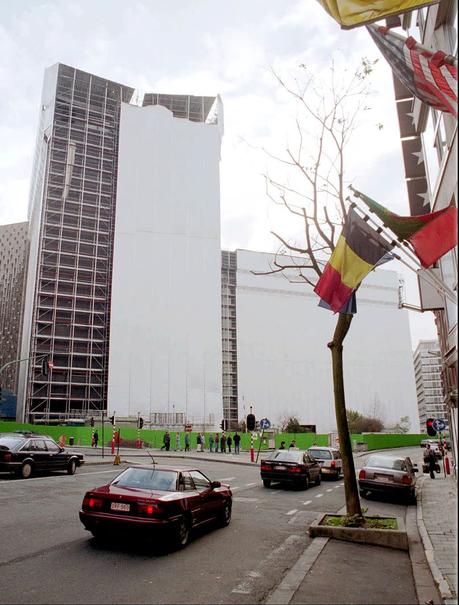In November 2023, despite strong opposition, the European Union extended authorization for the use of the toxic herbicide glyphosate for another ten years - and has now abandoned its Green Pact pledge to cut pesticide use by 50% .
The current situation with pesticides is reminiscent of the asbestos tragedy: there are many similarities, including a lack of justice. In Europe, a criminal trial took place only in Italy in 2012.
And that is why we, as managers of European mutual health organizations and public health stakeholders, call for decisive action to defend the right to health and preserve social protection systems.
In the 20th century, we took action to stop the poisoning of workers exposed to asbestos. We defended the victims so they could get the compensation they needed and deserved.
But all this should have been avoided: although the toxicity of asbestos was identified in 1906, it was not until 2005 that it was banned in Europe. There was, in fact, a whole century of political denials, despite increasing numbers of scientific publications and hundreds of thousands of deaths.
Tragically, these poisonings and deaths continue today because asbestos is still widely present. The asbestos industry lobbied hard to make people believe that controlled use of this dangerous mineral was possible, delaying the eventual ban and adoption of effective prevention rules.
It is estimated that between 4 and 7 million European workers are still exposed to asbestos every day.
Today we launch an urgent appeal: let's not make the same mistake with pesticides. Let us not repeat the disastrous approach that still causes more than 90,000 deaths per year in Europe, as well as many forms of cancer.
The asbestos tragedy and the current pesticide situation share many of the same characteristics, and it is essential to understand them if we want to prevent another disaster.
The story continues
An initial fascination contributed to a collective blindness
Asbestos was presented as a magical mineral thanks to its many possible applications, from insulation to fire resistance.
The same thing happened with pesticides when they came into mass production in 1945: they were apparently wonderful new toys with spectacular effects, giving us complete control over nature.
In 1943, industry insiders discovered that 80% of mice exposed to asbestos developed lung cancer - but they kept the results of these studies secret.
Late 19th century laws on industrial accidents and occupational diseases mean that these can be seen as "insurable risks" rather than as hazards to be eradicated. This situation is unacceptable.

The multinational agrochemical company Monsanto showed the same cynical dishonesty in the late 1990s when it chose to conceal an internal research report revealing the genotoxicity of herbicides containing glyphosate.
The apparent invisibility of work-related diseases is because work risks and their health consequences have been normalized.
Late 19th century laws on industrial accidents and occupational diseases mean that these can be seen as "insurable risks" rather than as hazards to be eradicated. This situation is unacceptable.
Health warnings are ignored
The current political attitude - which favors paying minimal compensation afterwards rather than making serious efforts at prevention in advance - reflects the influence of lobbies at the highest level.
How can we justify the continued use of toxic pesticides in Europe when occupational diseases linked to pesticides - such as prostate and blood cancer and Parkinson's disease - are both recognized and compensated by social security in France? It's the same lack of consistency in public health that we saw with asbestos in the 20th century.
It is impossible to ignore the parallels between the tragedy of asbestos and, today, pesticides.
It is so clear: we must ban all synthetic pesticides and implement agroecological practices that promote health and nature as quickly as possible. What are the European Commission, the European Parliament and the Member States waiting for?


Scientific research has shown that pesticides are responsible for a 70% collapse in human spermatozoa and the disappearance of 80% of flying insect populations.
It is not a matter of human health on the one hand and healthy biodiversity on the other: in fact, our fates are linked, and pesticides are disastrous for both.
Furthermore, a 2019 ruling by the Court of Justice of the European Union shows that pesticides sold today do not comply with the law because their toxicity has never been properly evaluated.
It is so clear: we must ban all synthetic pesticides and implement agroecological practices that promote health and nature as quickly as possible. What are the European Commission, the European Parliament and the Member States waiting for?
We are better off without them
A new agricultural paradigm - one without pesticides - will be healthier for us, for our farmers and for our climate.
And we must support our farmers logistically and financially as they chart this new course.
Our social protection systems are unable to support the continued increase in diseases such as cancer and neurological disorders due to hormonal and nervous disorders.
Pesticides - made from petroleum and full of hidden toxins - are partly to blame.
For the sake of our future, we must learn from the asbestos tragedy of the past.
Agnieszka Basińska is director of the Community Aid Association "Flandria" in Poland; Francis Balay is chairman of Alternative Mutualiste in France; and Xavier Brenez is director general of Mutualités Libres in Belgium. A total of 40 organizations from three European countries, representing more than 30 million Europeans, have co-signed this opinion piece. At Euronews we believe that all opinions matter. Contact us at [email protected] to send pitches or submissions and join the conversation.